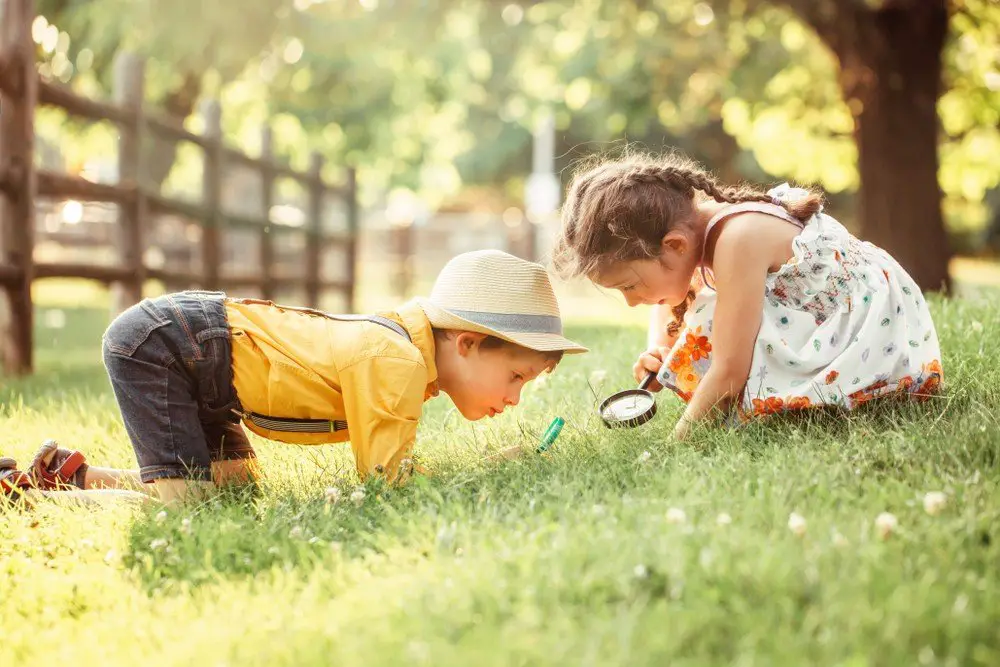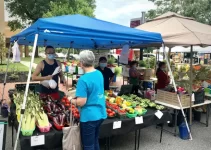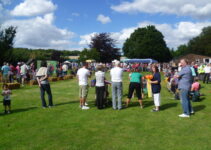There are many things that make village life wonderful. The sense of community, the feeling of belonging and the awareness that you are part of a way of life that dates back millennia.
Villages bring people together and part of that togetherness stems from the events that happen throughout the year. Village get-togethers are part and parcel of village life.
These activities vary from season to season. You might find villagers carol singing in the parish church in winter, Morris dancing in front of the village pub in May or playing cricket on the green in the summer months.
But an event that can be held at any time of the year and one that brings village families together is a treasure hunt.
And whether you’re raising money for a good cause or to inject some fun into village life, we’ve got some great tips for holding your own village treasure hunt.
How Do You Organise a Community Treasure Hunt?
Treasure hunts are a great way to create a buzz in your village and they’re relatively easy to organise. But to make the village treasure hunt successful and stress-free for the organiser, it’s good to have a clear goal in mind.
That’s why we’ve set out some guidelines to help you refine the whys, whats and hows of your hunt.
What’s the purpose of your village treasure hunt?
The first thing to decide is why you’re doing a village treasure hunt. Is it for a special occasion? If so, it might give you some direction when organising things.
If the treasure hunt is for something or someone important, rounding up locals to help and participate shouldn’t be hard.
Birthday or Anniversary Treasure Hunt
Perhaps your hunt is to celebrate a significant birthday for a local character and you’d like to get the whole village involved to make it a big event. Your hunt could focus on key locations within the village that are of importance to that person.
Clues can centre around things such as the primary school where the person was a pupil, or the village church where they were baptised or married.
And at the end of your treasure hunt, the final clue can direct people to the pub or the village hall where you can celebrate the event in style.
Themed Treasure Hunt
If your aim is just to get the village together, you might prefer a themed event. Easter, Halloween or May Day events are lovely.
Or use the theme of times past to get your village neighbours wearing their wackiest flares or straw boaters.
If the village has a person of significance in its past, you could centre the hunt around them and ask people to dress in period clothes for some extra fun.
Learn While You Hunt
If the treasure hunt is part of a bigger village event like a fayre or fete, then you could expect some of the participants to be less familiar with aspects of your village.
It might be a great opportunity to introduce visitors to important historical or cultural aspects of your village.
Clues and locations can help entertain but also educate in this way. This also works well for visiting kids’ groups, like Scouts or Brownies.

Fundraising
If your treasure hunt is to make some much-needed cash for a good cause in the village, you’ll need to think about how you can generate as much money as possible.
You could take an entrance fee or ask for donations before you start.
Could you raise extra funds by having a tea or beer tent at the end of the hunt or by holding a raffle? Could there be village wares for sale at strategic points on the hunt to boost funds?
What’s the time and date?
Deciding what the purpose of your village treasure hunt is will also help to define when it’s held and what locations you pick.
If fundraising is your aim, then weekends and bank holidays might be best to encourage more families to take part. This will also encourage people from other areas to attend your event.
While most village treasure hunts lend themselves to summer events, there’s no reason why you couldn’t organise a yuletide hunt to add to the excitement of Christmas or to walk off some of the extra festive calories.
Who’s on the planning team?
Once you’ve decided why you’re having your village treasure hunt, you’ll need to think about help.
Village treasure hunts can be reasonably straightforward but they do need planning and organising. It’s good to have as many hands to the pumps as possible.
But whatever village event you’re holding it’s always good to enlist the help of enthusiastic volunteers to help you plan and execute it.
If it’s for a specific person, family and friends will be glad to help. If it’s for the parish church, the congregation will be up to provide support – you get the idea.
This way, you can divide responsibilities among team members, assigning tasks like clue creation, route planning, publicity, and safety management.
Have you got a budget?
Treasure hunts don’t need to cost more than your time. But if you’re raising money for your village you might need some financial help with expenses.
Advertising and Printing
Associated costs might be in the form of photocopying for the clues, questions or maps. Or it might be printing posters to advertise your hunt.
This is where your planning team can get creative. Photocopying might be donated by a local business or the village school.
You can use free advertising resources like your local newspaper or parish newsletters to get the word out. Or if you have someone tech-savvy on your team, they could use social media to whip up interest.
Prizes
Prizes can be costly but they are a great incentive to encourage people from outside of the village to take part in your event.
Local businesses can help by donating goods or services. Or you could ask villagers to contribute to a prize hamper.
If funds are tight, you could ask villagers to pledge their time or a skill. This could be in the form of an hour’s worth of gardening, some treats baked for a special occasion or some tutoring in an art or craft.
Get your village hunt route sorted
Villages come in all shapes and sizes so you may want to limit your route to some of the central areas of your village.
You can do a kid-friendly treasure hunt in one safe location such as the village green or recreation ground.
Or for easy walking, you can take in a few of the village locations that are most closely situated. It’s likely these will include the church, pub and village hall and this will help you manage the safety of your participants too.
Consider the accessibility of your route to make your village hunt as inclusive as possible. Older residents may have mobility issues but still want to take part – make sure the route works for them.
Of course, if your village is larger you may want to make it a more expansive event and include a bike route or even make it a driving treasure hunt.
Driving or cycling treasure hunts are also a great way to add some competition to the treasure hunt. And, if you want to make a really big thing, you could ask neighbouring villages to join in and make it an inter-village affair.
If you are using locations in the village which are not common ground, you’ll want to make sure you’ve got permission.
Any caveats that landowners have can be added to your treasure hunt rules.
Is your village treasure hunt safe?
Safety should be a top priority. Do a risk assessment (even an informal one) and have first-aid supplies on hand. Communicate safety guidelines to all participants before the event begins.
Set up Checkpoints. Have volunteers stationed at key points around your village or at tricky points along your planned route.
This way, your marshals can advise or guide participants around potential hazards and provide assistance if needed.
No matter how well things are planned, sometimes a cog will be thrown into the works and it’s better to be prepared for a problem than unprepared. This way you’ll avoid panic.
Running a Smooth Village Treasure Hunt
On the day of the treasure hunt, check your last-minute preparations. Have your questions, clues or route maps ready and distribute them to the key locations around the village.
Either set up checkpoints where participants can receive clues after solving the previous one or give them a handout sheet with the full set of clues or questions for them to follow independently.
At the time of the event, gather all participants, explain the rules, and start the treasure hunt.
Once the treasure hunt is over, gather everyone for a celebration. Announce the winners and award the prizes. Consider providing small tokens of appreciation for all participants, such as certificates or goody bags.
Remember to have fun and create a positive atmosphere throughout the event. A well-organized treasure hunt can become a memorable experience that brings the community together.
Treasure Hunt Questions or Clues
Treasure hunt questions or clues can come in many forms. And the types of questions you ask will depend on the event type and the participants.
If the village treasure hunt is mainly for adults then the questions can be a little trickier. For families, you may want to include a variety of questions so all the family feels involved. And for kids, you’ll need to keep the clues relatively simple.
Here are some ideas for a village treasure hunt questions or clues which will suit a variety of different treasure hunters:
Historical or cultural questions
If your treasure hunt is just for locals you can get away with very specific and more tricky questions. These can focus on the key events in the village’s past or current events of the village.
Tip: remember to make sure you don’t include any questions about things that your friends and neighbours might take offence over.
A village treasure hunt is supposed to bring the village together not cause a feud!
Rhyming questions
Rhyming questions are great for a mixed age range. But kids especially love rhyming clues or questions, so this type would be a great choice for a kids’ village treasure hunt.
Riddle clues
Riddles are usually a little harder to solve so might suit older kids or adult treasure hunters. Historically, riddles were often meant to be slightly comic (sometimes even a bit spicy). So this might be a good clue type if your crowd are up for a laugh.
Picture clues
Picture clues are great for kids. But you can make the pictures more cryptic by zooming into a particular feature of a village landmark – this can be a good way to get the adults scratching their heads too.
Puzzles clues
To make your village treasure hunt a little more exciting you might want to mix up the activities at each location.
You could provide acrostics, crossword or maths puzzles or activities such as a jigsaw puzzle or a physical challenge to complete before the next location is provided.
Location details can even be provided in the form of GPS Coordinates if you’re doing a riding or driving village treasure hunt.
Offering a mix of different clue types will keep the treasure hunt exciting and engaging for everyone involved. And most importantly, have fun and let your creativity shine while designing the clues!
Treasure Hunt Top Tip:
Don’t forget to test the questions or clues before the event. And, if possible, test the clues with a small group of the type of people taking part to ensure they are clear, accurate, and solvable.
This will help you identify any potential issues so you can make necessary adjustments.
Some Ideas for Treasure Hunt Clues
Because this treasure hunt is a village event, you’ll want to tailor your questions to your particular location. So centre your questions around the key elements of a village such as:
- The parish church
- The parish/village hall
- The local school
- The pub
- The village green or park
- The village shop
- The library or reading room
- A war memorial or village site of interest, such as standing stones.
If you’re still a bit unsure, here are some ideas for questions or clues which we think would work for most villages to get you started:
Parish Church
Where is this place of peace and calm,
And through whose doors your soul finds balm?
(Answer: The church)
You measure my life in hours, and I serve you by shrinking.
I’m quick when I’m thin, and slow when I’m fat. The wind is my enemy. What am I?
(Answer: A candle)
Village Hall
What has keys but can’t open locks?
(Answer: Piano)
Next, it’s time to grab a bite, where dishes sizzle, and flavours unite. Find the spot where food’s prepared, the next clue awaits, so don’t be scared.
(Answer: The kitchen)
Village School, Library or Reading Room
I write but don’t breathe and I’m shut up in a case from which I am rarely released.
What am I?
(Answer: Pencil/graphite)
In a quiet nook, where whispers flow and knowledge blooms our minds can grow. Amongst the scholars, you’ll find the way, the next clue awaits, bright as day.
(Answer: In a reading corner or study area of the library).
Village Green
Where sports are played, and victories won, the next clue waits beneath the sun.
(Answer: Cricket stump or goal post)
I am old but strong. I fear nothing but fire or an axe. I may sound fearsome but my arms spread wide for all to shelter beneath me. What am I?
(Answer: An ancient or prominent tree)
The Pub
A game of skill and balls of white, find the place where cues ignite.
Amidst the sticks and coloured balls, your next clue hangs upon the wall.
(Answer: The pool table.)
I’m made of strong stuff but move freely when pulled. A weep often but my tears make people happy. What am I?
(Answer: Beer pump)
War Memorial
To honour the fallen, I stand tall, with names of heroes who answered the call, for all those lost but not forgot. On my base, the next clue you’ll spot.
(Answer: war memorial or monument)
Feel free to use these questions as they are or modify them to fit your treasure hunt’s theme and difficulty level. Or use them as inspiration for more specific questions about your village.
We know that any event in a village requires a little bit of effort but we hope our ideas take some of the ‘leg work’ out of your village treasure hunt planning.
Not only will your treasure hunt be a great activity for your village community but it can help create memories for your neighbours to share for many years to come.
You never know, you may even create a new village tradition!
Happy treasure hunting!



